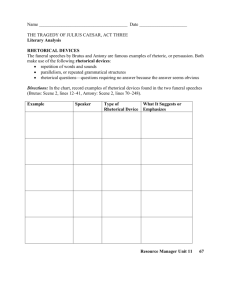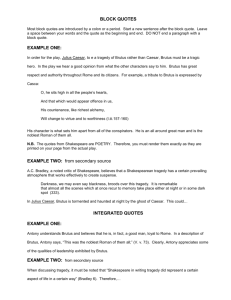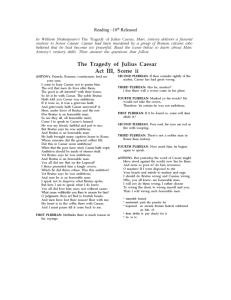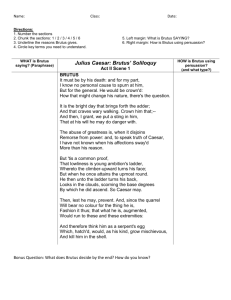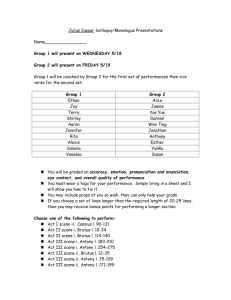Brutus` Speech:
advertisement
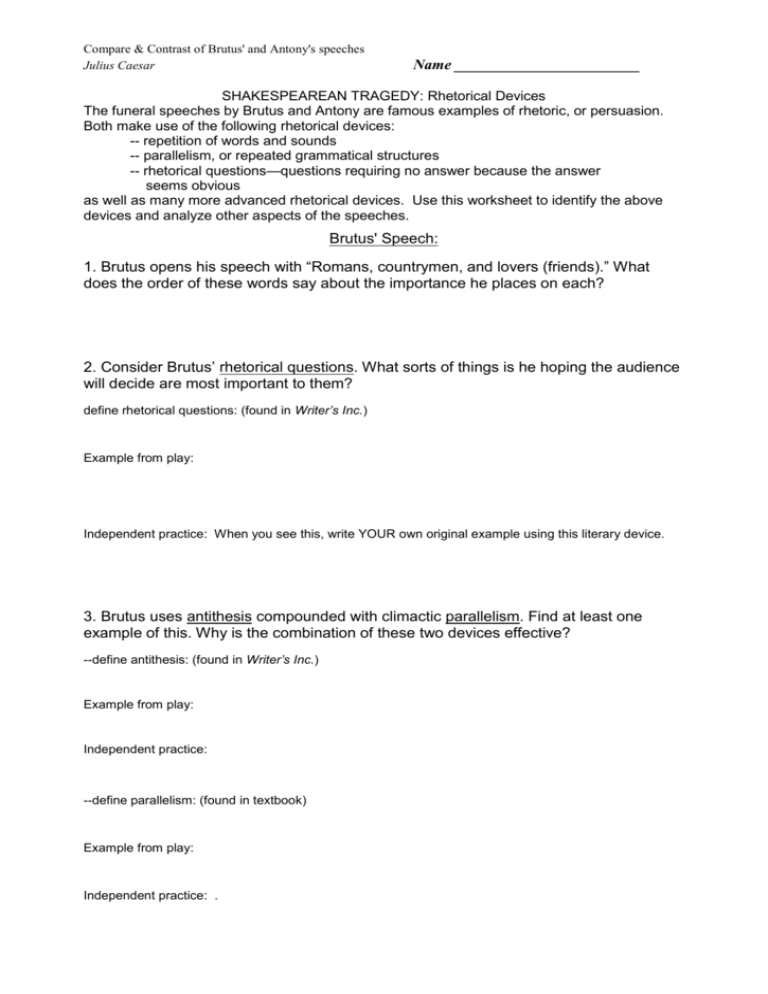
Compare & Contrast of Brutus' and Antony's speeches Julius Caesar Name ________________________ SHAKESPEAREAN TRAGEDY: Rhetorical Devices The funeral speeches by Brutus and Antony are famous examples of rhetoric, or persuasion. Both make use of the following rhetorical devices: -- repetition of words and sounds -- parallelism, or repeated grammatical structures -- rhetorical questions—questions requiring no answer because the answer seems obvious as well as many more advanced rhetorical devices. Use this worksheet to identify the above devices and analyze other aspects of the speeches. Brutus' Speech: 1. Brutus opens his speech with “Romans, countrymen, and lovers (friends).” What does the order of these words say about the importance he places on each? 2. Consider Brutus’ rhetorical questions. What sorts of things is he hoping the audience will decide are most important to them? define rhetorical questions: (found in Writer’s Inc.) Example from play: Independent practice: When you see this, write YOUR own original example using this literary device. 3. Brutus uses antithesis compounded with climactic parallelism. Find at least one example of this. Why is the combination of these two devices effective? --define antithesis: (found in Writer’s Inc.) Example from play: Independent practice: --define parallelism: (found in textbook) Example from play: Independent practice: . Compare & Contrast of Brutus' and Antony's speeches Julius Caesar Name ________________________ 4. In one sentence, express the purpose of Brutus’ speech and his principal means of achieving it. Anthony's Speech: 5. Before Antony spoke, had Brutus effectively achieved his purpose? 6. Contrast Antony’s opening to Brutus’. What effect does the difference in the order of the words have? 7. What is the first example of paralipsis Antony uses in this speech? How does it set up the audience’s expectations for the rest of the speech? See next page… paralipsis (par-a-lip'-sis) from Gk. para, "side" and leipein, "to leave" ("to leave to one side") Stating and drawing attention to something in the very act of pretending to pass it over. A kind of irony. Example: It would be unseemly for me to dwell on Senator Brown’s drinking problem and too many have already sensationalized his womanizing, so I won’t mention it. (But the speaker just did!) Example from play: Independent practice: . 8. Antony repeatedly refers to Brutus and his co-conspirators as “honourable.” What effect does the continued repetition of this word have on the tone of the words around it? 9. Like Brutus, Antony uses rhetorical questions; what does he hope the audience will think as a result of them? Compare & Contrast of Brutus' and Antony's speeches Julius Caesar Name ________________________ 10. Consider the last few lines of Antony’s speech. How is his “pause” different from Brutus’? What do these lines reveal about Antony’s strategy? 11. Spot one logical fallacy in the thinking of the citizens. define logical fallacy: (found in Writer’s Inc.) Example from play: Independent practice: . 12. Antony once again uses paralipsis. How? What is his purpose? Does he achieve his aim? 13. The repeated word “honorable” appears again; this time not only Antony uses it, but the Fourth Citizen as well. What does its use reveal about the effect of Antony’s speech on his audience? 14. In one sentence, express the differences in purpose and methods between Brutus’ and Antony’s speeches.


